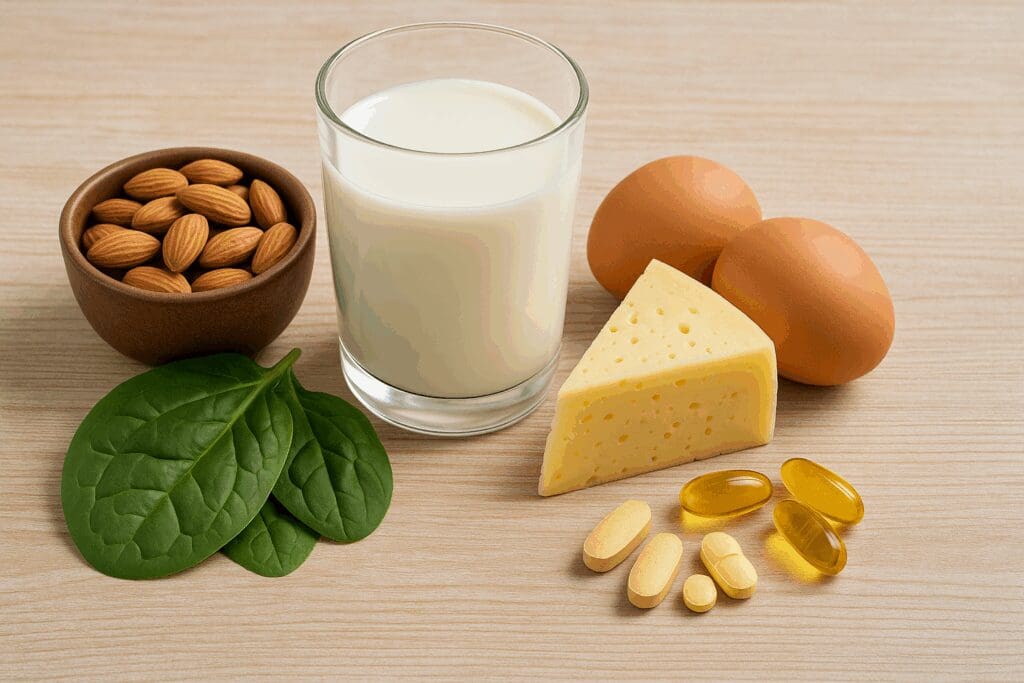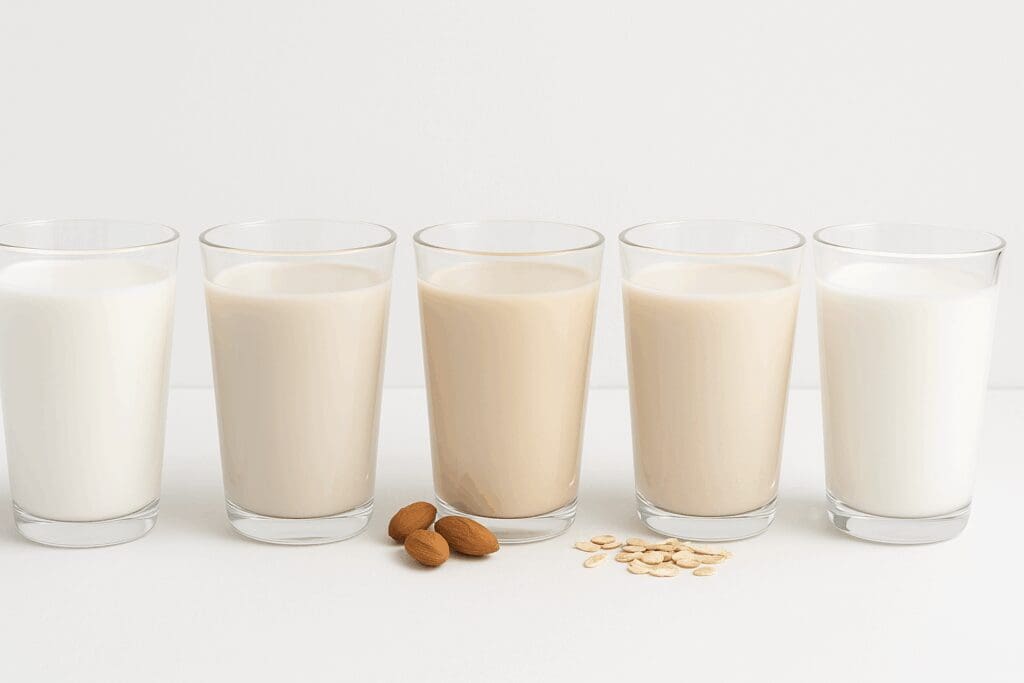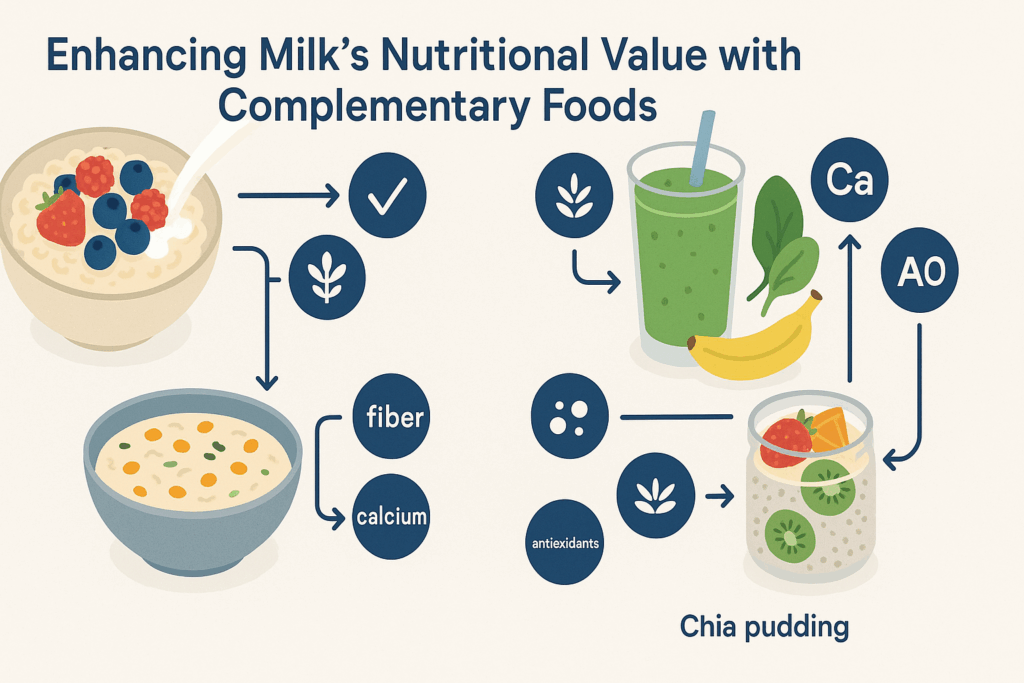Pregnancy is a transformative phase marked by profound physiological and emotional changes. As expectant mothers navigate this crucial journey, nutrition emerges as a cornerstone of both maternal well-being and fetal development. Among the numerous dietary choices available, milk holds a longstanding reputation for supporting maternal health. The benefits of drinking milk while pregnant extend far beyond mere tradition or convenience; they are grounded in scientific understanding of maternal-fetal nutrition. Incorporating milk into a balanced pregnancy diet offers essential nutrients that contribute to the health of both mother and baby, reinforcing its role as a vital component of prenatal care.
You may also like: 7 Vital Reasons to Choose Yogurt for Pregnant Women’s Diet

Understanding the Nutritional Profile of Milk in Pregnancy
Milk is often celebrated for its dense nutritional composition, and for pregnant women, this attribute becomes especially critical. A single glass of milk offers a robust combination of macronutrients such as high-quality proteins and essential fats, along with a spectrum of micronutrients including calcium, phosphorus, magnesium, iodine, and vitamins A, B12, and D. The presence of riboflavin and niacin further supports energy metabolism, which becomes increasingly important as pregnancy progresses and the body’s demands intensify.
These nutrients are not only essential in isolation but work synergistically to support various aspects of maternal and fetal health. For instance, calcium and vitamin D collaborate to build the baby’s bones and teeth, while protein supports cell growth and repair for both mother and fetus. The iron content in fortified milk can assist in preventing pregnancy-related anemia, especially when combined with vitamin C-rich foods that enhance iron absorption. This interconnected nutrient matrix positions milk as a practical and effective dietary inclusion for supporting prenatal nutrition.

Calcium and Bone Health: A Dual Benefit for Mother and Baby
One of the most recognized advantages of milk consumption during pregnancy is its contribution to bone health through its high calcium content. Calcium is indispensable for the formation of the fetal skeletal system, particularly in the second and third trimesters when bone mineralization accelerates. A consistent intake of milk ensures a steady calcium supply, reducing the likelihood of maternal bone demineralization—a process where the mother’s body compensates for fetal needs by drawing calcium from her own stores.
In addition to fostering fetal bone development, adequate calcium intake has long-term benefits for maternal bone density. Women who maintain optimal calcium levels during pregnancy are less likely to experience postnatal bone loss or osteoporosis later in life. Furthermore, calcium plays a pivotal role in supporting cardiovascular health and muscle function, both of which are essential for the increasing physical demands of pregnancy. Thus, drinking milk offers a dual advantage by nurturing the structural foundation of both generations.
Protein Power: Building Blocks of Life
Protein is a macronutrient of paramount importance during pregnancy, and milk is an excellent source of high-quality protein containing all nine essential amino acids. These amino acids serve as the foundational elements for building the tissues, muscles, enzymes, and hormones essential for fetal development. As the baby’s cells multiply rapidly, an adequate protein supply ensures healthy organ formation and immune system development.
Beyond fetal growth, protein supports the mother’s increased blood volume and the development of uterine and breast tissue. It also contributes to sustaining maternal energy levels and preventing muscle breakdown. For vegetarians or women with limited dietary protein sources, milk offers a convenient and digestible option to meet daily protein requirements. This role in tissue synthesis and repair underscores milk’s indispensability in a pregnancy nutrition plan.

Hydration and Electrolyte Balance
While water remains the primary source of hydration, milk contributes significantly to fluid intake during pregnancy. Containing approximately 87% water, milk not only quenches thirst but also delivers vital electrolytes such as potassium, sodium, and magnesium. These minerals are crucial for maintaining fluid balance, nerve function, and muscular health—factors that become increasingly important as pregnancy advances and swelling, cramping, or dehydration may occur.
Potassium, in particular, helps regulate blood pressure, which is essential for reducing the risk of pregnancy-induced hypertension or preeclampsia. Meanwhile, magnesium supports neuromuscular transmission and may help alleviate common pregnancy complaints such as leg cramps or headaches. As a hydrating beverage with nutritional benefits, milk serves as a superior alternative to sugary or caffeinated drinks that offer little to no health advantage.
Supporting Digestive Health and Reducing Heartburn
Pregnancy often brings about changes in digestive function due to hormonal fluctuations and the physical pressure of the growing uterus. Heartburn, constipation, and nausea are common complaints among expectant mothers. Milk, particularly in smaller, frequent servings, can offer soothing relief from acid reflux or indigestion by coating the stomach lining and buffering stomach acids.
Furthermore, fermented milk products such as yogurt and kefir contain probiotics—beneficial bacteria that support gut health. These probiotics can improve digestive regularity, enhance nutrient absorption, and strengthen the immune system. For women who experience bloating or discomfort with regular milk, lactose-free or fermented options may offer similar benefits without the associated digestive upset. Thus, milk’s versatility extends to promoting gastrointestinal comfort during pregnancy.

The Role of Vitamin D and Immune Support
Vitamin D is a nutrient of growing interest in maternal health due to its role in immune modulation, bone metabolism, and mood regulation. Many milk varieties are fortified with vitamin D, making them a reliable source for pregnant women who may have limited sun exposure or dietary diversity. Adequate vitamin D levels support calcium absorption and prevent complications such as gestational diabetes, preeclampsia, or low birth weight.
Moreover, vitamin D contributes to the maturation of the fetal immune system and may reduce the risk of allergic conditions or autoimmune diseases in infancy. It also supports the mother’s immune defenses during a time when physiological changes can make her more susceptible to infections. Integrating milk fortified with vitamin D into the pregnancy diet ensures a proactive approach to safeguarding both maternal and fetal health.
Examining the Benefits of Drinking Milk While Pregnant for Fetal Brain Development
Emerging research underscores the importance of maternal nutrition in shaping neurodevelopmental outcomes. The benefits of drinking milk while pregnant include enhanced fetal brain development, supported by nutrients such as iodine, choline, and B vitamins. Iodine, abundant in many dairy products, is crucial for the synthesis of thyroid hormones, which in turn regulate brain maturation and cognitive function.
Choline, a lesser-known but equally essential nutrient, plays a vital role in the formation of cell membranes and neurotransmitters. While not all milk varieties contain high levels of choline, many dairy-based products contribute to its overall intake. B vitamins, especially B12 and riboflavin, support energy metabolism and neurogenesis, laying the groundwork for a healthy central nervous system. This confluence of neuroprotective nutrients underscores milk’s unique value in prenatal brain health.

Best Milk During Pregnancy: Navigating Choices for Maximum Benefit
While the benefits of drinking milk during pregnancy are well-documented, the type of milk consumed can influence the extent of these benefits. The best milk during pregnancy often depends on individual dietary needs, preferences, and tolerances. Cow’s milk remains the most popular choice due to its comprehensive nutrient profile, including calcium, protein, and vitamin D. However, other options may better suit specific health considerations.
For women with lactose intolerance, lactose-free cow’s milk or fortified plant-based alternatives such as soy, almond, or oat milk can provide similar nutritional benefits. Soy milk, in particular, offers a comparable protein content to cow’s milk and is often enriched with calcium and vitamin D. Almond milk is lower in calories and may be appealing to those managing gestational weight gain, although it lacks significant protein. Choosing the best milk for pregnant first trimester needs may also involve prioritizing digestibility and mild flavors, as nausea is common in early pregnancy.
Best Milk for Pregnant First Trimester: Easing into Nutritional Wellness
The first trimester marks a period of rapid cellular division and organ formation, making nutrient density critically important. During this phase, many women experience morning sickness, food aversions, or fatigue, which can complicate dietary consistency. The best milk for pregnant first trimester challenges is one that balances palatability with nourishment.
Plain, cold milk may soothe nausea in some individuals and provide a gentle source of calories and hydration. If traditional milk is difficult to tolerate, options like vanilla-flavored soy milk or lightly sweetened almond milk may offer a more appealing taste while still delivering essential nutrients. Ensuring that any milk alternative is fortified with calcium, vitamin D, and B vitamins is essential to maintain the nutritional integrity of the diet during this delicate stage. The early integration of milk sets a strong foundation for sustained health throughout pregnancy.
Milk for Pregnant Women: An Accessible Source of Vital Nutrients
For many expectant mothers, the practicality of milk lies in its accessibility and versatility. Available in a variety of forms—fresh, powdered, flavored, or fermented—milk for pregnant women can easily be incorporated into a diverse range of meals and snacks. From breakfast smoothies and cereal toppings to creamy soups and sauces, milk lends itself to creative, nutrient-rich culinary applications.
This adaptability makes milk particularly valuable for meeting nutritional needs without overwhelming the palate or schedule. Women with busy lifestyles or limited appetite may find that incorporating milk into quick meals is an efficient way to boost nutrient intake. In multicultural dietary contexts, milk also plays a traditional role in pregnancy rituals and comfort foods, further enhancing its acceptance and significance.
Milk Is Good in Pregnancy: Addressing Myths and Misconceptions
Despite its many benefits, some myths persist regarding milk consumption during pregnancy. Concerns about excessive weight gain, allergies, or hormonal content often deter women from including milk in their diets. It is important to distinguish between evidence-based recommendations and anecdotal fears. In moderation and as part of a balanced diet, milk is good in pregnancy for most women, offering measurable advantages without undue risk.
Modern dairy farming practices and regulatory standards ensure that milk on the market is safe and hormone-free or well-monitored. Additionally, choosing organic or grass-fed options may provide peace of mind for those concerned about additives. For women with familial allergy histories, gradual introduction and monitoring may help identify tolerance thresholds. A registered dietitian can provide individualized guidance to navigate these concerns while preserving the nutritional benefits of milk.
Milk for Pregnant Lady: Customizing Intake for Personal Needs
Personalizing nutritional choices is a hallmark of modern prenatal care. Milk for pregnant lady routines should reflect individual health status, lifestyle, cultural preferences, and dietary restrictions. Some women may require additional calcium due to previous deficiencies or multiple pregnancies, while others may need to focus on protein or caloric intake. Milk can be tailored to meet these needs through portion adjustments and product selection.
For instance, a physically active pregnant woman may benefit from full-fat milk for added energy, while another managing gestational diabetes might opt for unsweetened almond milk. Women with iron absorption issues can pair milk with vitamin C-rich fruits to mitigate potential interference. The ability to customize milk consumption ensures that it remains a relevant and effective component of a personalized pregnancy nutrition plan.
Evaluating Lactose-Free and Fortified Alternatives
In an increasingly diverse dietary landscape, lactose-free and plant-based milk options have become popular choices for pregnant women. These alternatives can be highly beneficial when properly fortified and selected with care. Lactose-free cow’s milk retains the original nutrient profile without the digestive drawbacks, making it ideal for women with lactose intolerance who still want the full benefits of drinking milk while pregnant.
Plant-based options, including soy, oat, rice, and almond milk, vary widely in nutritional content. Soy milk stands out for its high protein content, while almond milk may require careful fortification to ensure adequate calcium and vitamin D levels. Always reading labels to verify enrichment and avoid added sugars is a critical practice. Consulting a healthcare provider can further ensure that the chosen milk variant aligns with individual health goals and pregnancy requirements.

Enhancing Milk’s Nutritional Value with Complementary Foods
Maximizing the benefits of drinking milk during pregnancy involves thoughtful pairing with other nutrient-dense foods. Combining milk with whole grains, fruits, and nuts in meals such as oatmeal or smoothies can amplify its health impact. These combinations provide complementary fiber, antioxidants, and phytonutrients that enhance digestion and reduce oxidative stress.
Pairing milk with vitamin C-rich fruits like strawberries or oranges can improve iron absorption from fortified products. Likewise, blending milk into soups with leafy greens or legumes creates a balanced, satisfying dish rich in protein, fiber, and essential minerals. These integrated approaches exemplify how milk can be a central ingredient in a comprehensive pregnancy nutrition strategy that is both enjoyable and effective.
Practical Tips for Integrating Milk into the Pregnancy Diet
Consistency is key when incorporating milk into the daily diet, and small, sustainable habits often yield the best results. Starting the day with a milk-based smoothie or fortified cereal can ensure an early nutrient boost. Using milk in cooking—whether in mashed potatoes, baked goods, or sauces—provides subtle yet effective nutritional enhancements.
Timing also matters. Drinking milk between meals rather than alongside iron-rich foods like red meat may prevent nutrient absorption interference. For women prone to nighttime cravings or sleep disruptions, a warm glass of milk before bed can promote relaxation and satiety. These practical adjustments enable pregnant women to reap the maximum rewards of milk consumption without dietary monotony or discomfort.
Frequently Asked Questions About the Benefits of Drinking Milk While Pregnant
Why Are the Benefits of Drinking Milk While Pregnant Different From Other Times in a Woman’s Life?
The benefits of drinking milk while pregnant extend beyond the standard nutritional support that milk offers at other stages of life because of the unique metabolic demands during pregnancy. A pregnant woman requires more calcium, protein, and specific micronutrients to support both her own bodily functions and the growing fetus. Unlike other life stages, these nutrients are rapidly mobilized for fetal bone development, neurological growth, and placental function. Additionally, pregnancy alters hormonal pathways, enhancing the absorption of nutrients like calcium and vitamin D, making milk an even more efficient dietary tool. Therefore, drinking milk during pregnancy is not just supplemental; it becomes strategically vital.
Is There a Best Time of Day to Drink Milk for Maximum Nutritional Absorption During Pregnancy?
While milk can be beneficial at any time, consuming it between meals may enhance nutrient absorption, particularly of calcium and protein. Taking milk alongside iron-rich meals might inhibit iron absorption slightly, so spacing it out ensures that both calcium and iron are efficiently utilized by the body. Drinking milk at night can also support restful sleep due to its tryptophan content, which influences melatonin production. In early pregnancy, sipping cold milk in the morning might help ease nausea. Ultimately, timing should align with personal comfort, but strategic scheduling can help maximize the benefits drinking milk during pregnancy offers.
What Cultural and Regional Variations Influence the Choice of Milk for Pregnant Women?
Cultural and regional dietary habits significantly influence the type of milk pregnant women consume. In South Asia, for example, buffalo milk is often favored due to its higher fat content, which is believed to support fetal weight. In Scandinavian countries, fermented milk products like filmjölk are popular, contributing probiotics alongside calcium and protein. Meanwhile, in East Asian cultures where lactose intolerance is more prevalent, soy and rice milk fortified with essential nutrients are common substitutes. These regional preferences reflect how the concept of milk for pregnant lady routines adapts to local food traditions while still aiming to fulfill similar nutritional goals.
How Can Milk Help With Emotional Well-Being and Mental Health During Pregnancy?
Few people realize that milk contributes to more than physical health; it also supports emotional stability during pregnancy. The B vitamins found in milk, especially B12 and riboflavin, are known to enhance neurological function and reduce symptoms of stress and fatigue. Additionally, the amino acid tryptophan found in milk helps regulate serotonin levels, which can stabilize mood and reduce the risk of prenatal depression. Because hormonal shifts can amplify emotional volatility, nutrient-rich foods like milk provide a steady foundation for mental equilibrium. This psychosocial layer adds depth to the benefits of drinking milk while pregnant, positioning it as a food that nurtures both body and mind.
Are There Any Differences in Nutritional Needs for Milk Between the First and Third Trimesters?
Yes, the nutritional demands of milk for pregnant women vary significantly between trimesters. During the first trimester, a focus on nausea-friendly options like lactose-free or lightly flavored milk can be more effective in supporting nutritional intake without triggering aversions. The best milk for pregnant first trimester choices often include cold, bland varieties that ease gastrointestinal discomfort while still providing key nutrients like folate and vitamin B6. By the third trimester, the focus shifts to calcium, vitamin D, and protein, which are vital for fetal bone growth and maternal tissue maintenance. As the fetus grows rapidly, milk becomes an efficient source of dense, absorbable nourishment.
What Innovations Exist in Fortified Milk Products for Pregnant Women?
The dairy industry has introduced specialized fortified milk blends designed specifically for maternal health. These products often include added folic acid, DHA, zinc, and even iron to meet the expanding nutritional needs of pregnant women. Some brands have created probiotic-enriched versions that support gut health, which can be especially helpful for women experiencing constipation or irregular digestion. Others focus on reducing sugar content while boosting omega-3 fatty acid levels for fetal brain development. These innovations make it easier to access the best milk during pregnancy without relying solely on multivitamin supplementation, offering a food-based approach to comprehensive prenatal care.
What Role Does Milk Play in Reducing the Risk of Complications Like Preeclampsia?
Emerging research suggests that consistent calcium intake through milk may lower the risk of preeclampsia, a condition characterized by high blood pressure and organ stress during pregnancy. The mineral balance provided by milk—including calcium, potassium, and magnesium—helps regulate vascular tone and reduce oxidative stress on the endothelial lining of blood vessels. This stabilizing effect on blood pressure contributes to a healthier pregnancy, particularly in women with a history of hypertension. Moreover, the anti-inflammatory properties of vitamin D found in fortified milk further support circulatory health. These findings underscore why milk is good in pregnancy, not only for nutrition but also for risk mitigation.
Can Milk Be Used Strategically to Support Healthy Weight Gain During Pregnancy?
Yes, milk can be integrated into a weight management strategy for pregnant women, whether the goal is to ensure sufficient or controlled weight gain. For those needing to gain weight due to undernourishment or hyperemesis gravidarum, full-fat milk can serve as a calorie-dense, nutrient-rich option. On the other hand, low-fat or skim milk provides essential nutrients with fewer calories, helping women who need to moderate weight gain. Protein-enriched milk or milk paired with fiber-rich foods can enhance satiety and reduce cravings for less nutritious snacks. The flexibility of milk for pregnant dietary plans makes it a valuable tool for tailored nutrition.
How Can Milk Consumption Affect the Baby’s Long-Term Health?
The benefits of drinking milk while pregnant may extend into the baby’s postnatal life. Nutrients like iodine and vitamin B12 found in milk are foundational for neurological development, potentially influencing cognitive outcomes and academic performance later in childhood. Some studies suggest that maternal intake of calcium-rich foods can reduce the risk of hypertension and bone disorders in offspring. Additionally, consistent vitamin D levels during pregnancy may support immune programming in the fetus, lowering the risk of childhood allergies or autoimmune issues. These long-term outcomes highlight how milk consumption during pregnancy acts as an early investment in a child’s lifelong well-being.
What Are Some Creative Ways to Incorporate Milk Into a Pregnancy Diet Without Boredom?
Maintaining variety is key to sustaining a balanced pregnancy diet, and milk lends itself to numerous creative applications. Try blending milk with mango, banana, or spinach for nutrient-rich smoothies that deliver taste and nourishment. Chia seed puddings made with milk offer fiber, protein, and omega-3s in a satisfying texture. Homemade soups like cream of carrot or broccoli can incorporate milk for added richness and calcium. Even desserts such as rice pudding or custard can become nutrient-dense when made with fortified milk. These options ensure that milk for pregnant lady routines remain enjoyable while continuously supporting health goals.
The Essential Takeaway: Milk as a Foundation for Maternal and Fetal Well-Being
As the complexities of prenatal nutrition continue to unfold, the enduring role of milk remains clear and compelling. From supporting bone development and fetal brain maturation to improving digestion and immune resilience, the benefits of drinking milk while pregnant are multifaceted and deeply impactful. Choosing the best milk during pregnancy—and tailoring it to individual needs—empowers expectant mothers to nourish their bodies and their babies with confidence.
Milk is not a one-size-fits-all solution, but it is a reliable, accessible, and versatile nutritional ally. With informed choices and mindful integration, milk becomes more than a dietary staple; it transforms into a cornerstone of maternal and fetal health. Whether enjoyed in a comforting glass, blended into a vibrant smoothie, or simmered into a nourishing meal, milk offers a timeless yet scientifically validated pathway to a healthy pregnancy journey.



